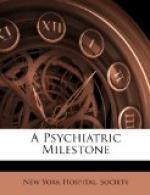The Chairman: Besides the Royal Charter, the New York Hospital is indebted to Great Britain for invaluable encouragement and financial aid in our natal struggle in Colonial days. Dr. Rows has added charmingly to that debt by journeying from London to take part in these exercises. His subject will be, “THE BIOLOGICAL SIGNIFICANCE OF MENTAL ILLNESS.”
As Director of the British Neurological Hospital for Disabled Soldiers and Sailors, at Tooting, he is giving the community and the medical world the benefit of his rich professional experience in the trying years of war as well as in peace, and gaining fresh laurels as he marches, like Wordsworth’s warrior, “from well to better, daily self-surpast.”
DR. ROWS
I must first express to you my keen appreciation of the high honor you have conferred on me by inviting me to come from England to address you on the occasion of the centenary celebration of the opening of this Hospital.
It is perhaps difficult for us to realize what resistances lay in the way of reform at that time, resistances in the form of long-established but somewhat limited views as to the nature of mental illnesses, as to whether the sufferer was not reaping what he had sown in angering the supreme powers and in making himself a fit habitation for demons to dwell in; in the form of a lack of appreciation of the need of sympathy for those who, while in a disturbed state, offended against the social organism or in the form of an exaggerated fear which compelled the adoption of vigorous methods of protecting the social organism against those who exhibited such anti-social tendencies. The men and women of the different countries of the world who recognized this and made it the chief of their life’s duties to spread a wider view of such conditions and to insist that the unfortunate people should be regarded and treated as fellow human beings will ever command our admiration.
By the courtesy of Dr. Russell I have had an opportunity of seeing the pamphlet in which are recorded the efforts of Mr. Thomas Eddy in the year 1815 to move his colleagues to consider this matter.[13] The result of those efforts was the establishment of an institution on Bloomingdale Road.
Various changes followed until we arrived at the Bloomingdale Hospital of to-day with its large and trained staff of medical officers, who, while still recognizing the difficulties of the task, are imbued with a hope of success which has arisen on a basis of wider knowledge, but which was unknown to many of their predecessors. To have the opportunity of joining with you in celebrating the big advance made a hundred years ago, of exchanging ideas with you with regard to the difficulties which still confront us, whether in America or in England, and which demand a united effort on the part of all who are interested in the scientific investigation of the subject, cannot fail to afford one the liveliest satisfaction.




